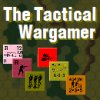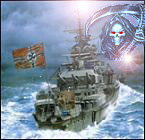madorosh
Posts: 390
Joined: 3/2/2003
Status: offline

|
quote:
ORIGINAL: Son_of_Montfort
Low fan numbers means low numbers of combatants and low subscriber profits. Historically based wargames lack the ability to create unexpected content (without making it ahistorical) and limit player options. I think, 10 years from now, wargmaes will look EXACTLY like they do now (maybe better graphics and some better scenarios). Look back 10 years, as any historian can tell, wargames today bear a marked resemblance to wargames then (at least in their mechanics). Some 10 year old games are being rereleased... yes I am talking to you Carriers at War... and Battlefront... and Cross of Iron... and Europa Universalis 3... 
EDIT: And Yoozername... that last comment is ridiculous. Multiplayer options in Wargames is the wave of the PAST. PBEM IS A MULTIPLAYER OPTION!! As is Hot-Seat. As is LAN. Sheesh... what do you call these things we have been doing for 20 years now... cooperative multi-person solo play?
SoM
I'll start with your good comments first, and I think you echo my thinking on this. The reason I started with some historical comments is for the very reason you state very well - wargames haven't changed much in the last decade other than by graphical upgrades. WEGO is an interesting mode of play but is nothing new - they were doing Simultaneous play in wargames in the 1970s. It was too cumbersome to make workable then; now we have computers to do the work for us. Even so, turn-based stuff like Steel Panthers or Airborne Assault still remains popular. There are reasons for this. And yes, you are correct - anyone thinking they are the first one to "think outside the box" is simply hubris.
quote:
What boggles my mind, is how people fail to see the logistic aspect (especially on a wargame forum) before arguing the theoretical aspects of something. Wargaming, without RTS games included in that title, will be hard pressed to every become a MMOG. Why? Simply put, MMOG require persistant manpower to keep functioning (server maintenance, in-game help, etc), a decent staff to keep watch over the "massive" (the fist M of MMOG) number of people who are live in the game, and a consistent development team who will periodically update the game so that players "stick with it" once they have delved fully into all the content. For most MMOG's to be successful they need to have a wide-enough fan base to cover costs, an attractive enough premise to appeal to casual gamers and hardcore gamers (a VERY small percentage of MMOG gamers), and a game design that allows for a near continuous stream of action so that one absence does not completely ruin a long game (turn based will shut down if a player goes AFK, long games like Europa Universalis can collapse if a person leaves and an AI takes over). Further, most MMOG rely on player-created or player-driven content to keep people interested even when the player has fully experienced all of the content.
I think you may be mixing up your genres. We're not talking about discovering worlds here - if you had a random map generator as flexible as Combat Mission's, it would work, but the reason they abandoned that in CM:SF was that it was too hard to do with current expectations on graphics. So you may have a point - even generating 3D building models for a realistic WW II landscape would be difficult to do at random, requiring dedicated modellers. There would be little financial incentive to do it, but a look at the OFP modders shows it can be done. For a very, very small market.
quote:
This last point is key. Why is WoW so addictive to millions of people? Because you, as a player, can chose your own goals, achieve goals in your own manner and at your own pace, and you never know exactly what the outcome of your action will be, due to the actions other players, random loot tables, player-based economy, and random spawn locations. How would you do this with, say, a WWII game? You can't suddenly introduce ahistorical weaponry to keep stuff interesting, you aren't going to allow Germany to fight for the allies, or give the player the option to create their own aircraft. It would be hard to keep interest, and since wargames have a niche market, it would get enough subscribers to cover costs and to keep up development. It is naive to think that developers haven't already thought of these ideas before and that most of them have judged them not profitable and continued to focus on solo or PBEM style play.
Games like Battlefield 2 (of 1942), Quake Wars, and the other FPS squad based multi-play games are not technically fully MMOG. Servers can be run privately by players (many are and connect through Gamespy's client), and content is not really persistent (he maps and their goals and their sides are always the same). These are actually simply multiplayer games, like connecting via a LAN, that have been expanded using internet connections.
If you argue the future of some wargames being in MMOG, without every PLAYING World of Warcraft or Guild Wars, both examples of tactical, group (or squad) based gameplay (even warfare in some cases) then you can't really argue effectively. The vast majority of WoW players are casual, despite popular mythology, and their "group tactics" vary wildly in quality. To expect that you could make a solely wargame MMOG and see decent fanbase and tactics is grossly inaccurate. WoW and GW are so popular because you can do other things beside fight, you can be solo or group, you see unexepected development and can customize your character in innumerable ways. Of course... WoW did build its fan base through its original RTS... 
If we're truly talking about a company-level game where units are squads and gun crews, the interesting thing will be the personalities in your unit, not the terrain you interact with. The history writes itself in your actions, in other words, not some fake D and D type backstory, but in your own experience with the game. Another reason the "poker tournament" example is particularly inappropriate.
_____________________________
|
 Printable Version
Printable Version











 That basically keeps people coming back, but it is the "terrain you interact with" that initially draws people in.
That basically keeps people coming back, but it is the "terrain you interact with" that initially draws people in. 
 New Messages
New Messages No New Messages
No New Messages Hot Topic w/ New Messages
Hot Topic w/ New Messages Hot Topic w/o New Messages
Hot Topic w/o New Messages Locked w/ New Messages
Locked w/ New Messages Locked w/o New Messages
Locked w/o New Messages Post New Thread
Post New Thread